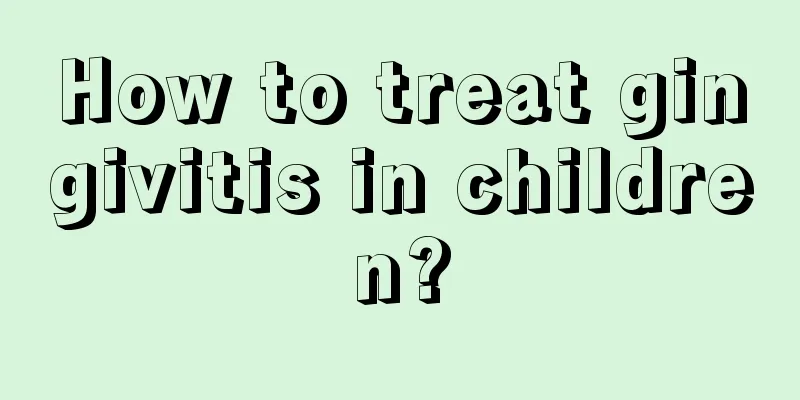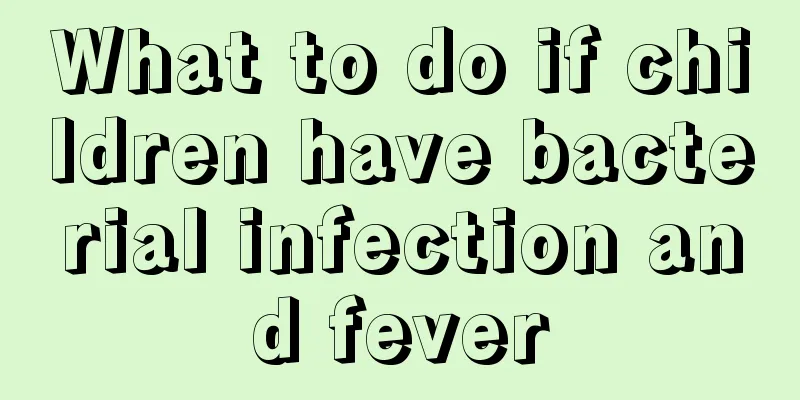How to treat gingivitis in children?

|
Gingivitis is a disease that occurs in the mouth. It is not contagious. Children's fever, swollen and painful gums, protruding teeth, and bleeding gums during teething are all symptoms of gingivitis. Children's gingival epithelium is thin and easily infected by bacteria. When oral hygiene is too poor, it will cause gingivitis. Gingivitis in children often manifests as bleeding, swollen and painful gums. If it is severe, it can lead to periodontitis. So, how to treat gingivitis in children? If you find that your child has gingivitis, you should take your baby to the doctor within 24 hours. Many babies are afraid of dentists. You should comfort them more and encourage them to cooperate with the doctor for examination and treatment. You should also teach your baby to brush his teeth in the correct way, and insist on brushing his teeth in the morning and evening, rinsing his mouth after meals, and eating a healthy diet. Let the child drink water with a straw to reduce irritation to the gums. Be careful not to let the child drink water that is too hot to avoid burns. If your baby's gums bleed severely or he or she complains of severe toothache all the time, you should take your baby to the doctor immediately. Dietary conditioning: After suffering from gingivitis, the baby's diet should be light, eat more vegetables and fruits, pay attention to nutritional balance, eat more easily digestible foods rich in B vitamins, and avoid picky eating. Eat more fresh vegetables and fruits, drink plenty of water, and try to eat less spicy and irritating foods. The first step in prevention is to pay attention to strengthening your baby's physical exercise, improving physical fitness and increasing disease resistance. Secondly, teach your baby to develop good oral hygiene habits, remove tartar in time, and eliminate its adverse stimulation to the gums and periodontal tissues. Supplementing with enough vitamin C on a regular basis can prevent bleeding gums and infections. Often eat hard foods such as cucumbers, raw radishes, and fruits. These foods will not only increase the baby's nutrition, but also provide friction and exercise for the baby's teeth and gums, promoting periodontal blood circulation. After reading the above content, I believe everyone has a certain understanding of how to treat gingivitis in children. Oral hygiene and daily eating habits may cause gingivitis. Parents should pay attention to correcting some of their children’s bad hygiene habits to prevent gingivitis. Teeth are also very important organs of human beings. Without teeth, we would not be able to eat many delicious foods. I hope the above information is helpful to you. |
<<: What to eat to enhance the baby's resistance
>>: What do children eat to make their eyes big?
Recommend
5 tips to help your child sleep well
The incidence of sleep disorders among Guangzhou ...
What is the treatment for pharyngitis in children?
Families don't want to see their children inv...
Children's Massage for Sore Throat
The baby's sore throat is mostly caused by in...
What are the symptoms of spleen deficiency in babies?
Spleen deficiency is mainly a term used in tradit...
What to do if your child has tonsillitis and fever
We all know that it is common for children to get...
What to do if your child has a hoarse throat and phlegm
We all know that children are in a period of rapi...
What should I do if my child is allergic to ultraviolet rays?
Because children's skin may be relatively fra...
Some care methods for children with fever and sweating
What should you do if your child has a fever and ...
What is the cause of foamy urine in children?
Generally speaking, it is not a big deal if there...
What medicine should children take for wind-heat cold
Wind-heat cold in children is a type of children&...
Reasons why children have poor sleep
Children's poor sleep is related to environme...
Yellow palate in newborns
Many newborns have symptoms of yellow palate, whi...
What are the early symptoms of cerebral palsy in babies?
Cerebral palsy is a very dangerous disease that t...
What should a six-year-old eat to grow taller?
Many six-year-old children have incomplete physic...
Can children drink wolfberry soaked in water?
We all know that wolfberry has a very good nouris...









